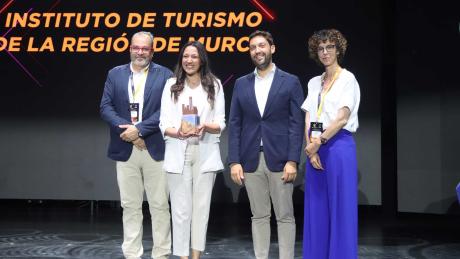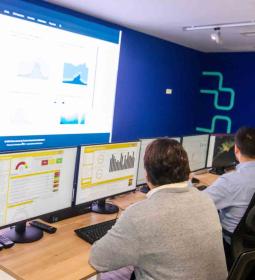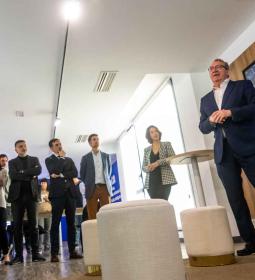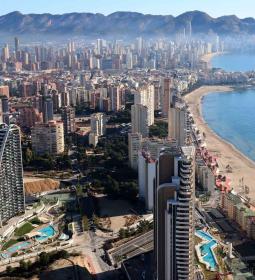Aida García places Dinapsis as a successful Innovation Center "that has been a scalable case at the national level"
Benidorm presents its commitment to applying technology in a "positive, ethical, and purposeful" way at Digital Tourist

Benidorm City Councillor for Innovation, Aida García Mayor, yesterday expressed the local government's commitment to the application of technology in a "positive, ethical, and purposeful way." The councilor outlined the council's position during the panel discussion on "Tourism Innovation Centers," where she was joined by other experts in the field, such as Quim Martínez (Mastercard), Ainhoa del Val (Telefónica), Alejandro Mullor (Microsoft), and Juan Luis Quincoces (Marina Innova Hub Lanzarote). The panel was moderated by Sandra Figaredo, secretary of the board of directors of Ametic and CEO of Insomnia.
The Benidorm councillor noted that the city has many success stories in the application of technological innovations, such as water management. “We turned necessity into a virtue. We have a network that is almost entirely sensorized, and we have achieved 96% efficiency. We barely lose any water because we are aware that one of the greatest challenges facing a city like ours is not running out of water in the middle of August,” he stated. In this regard, García cited the example of Dinapsis “as a very important innovation center” that has also “been a case that can be scaled nationally.”
In this regard, García noted that the City Council's objective in this area is to bring together entities of different kinds “from large companies to entrepreneurs, startups, researchers, etc.” and that together they “propose innovative solutions to the great challenges facing advanced tourism management, from sustainability to optimizing the management of municipal resources.” “At City Council, we firmly believe in this, and that is why we are promoting a tourism innovation hub,” he added, referring to the BeCiti project.
“We are very excited about this project and believe this is the way forward: to reach a consensus on the challenges between the public and private sectors and act as facilitators for the solutions that startups and other companies can provide,” stated Aida García.
At another point during the discussion panel, the Benidorm councillor also considered that public planning when using technology is “fundamental,” and in this sense, she recalled when Benidorm began developing what would become the DTI (Technological Innovation and Development Centre). “We barely had any technology, but we were already thinking about the problems the city was facing and how to manage them. Technology must be at the service of the administration or private companies, but always through planning,” she warned.
García Mayor also explained that one of the concerns for a local administration is to avoid a lack of continuity after the pilot tests carried out in the city. “The challenge is to design support, scaling, and financing processes after the pilot to be able to transform the prototypes into implemented solutions,” she explained.
Digital Tourist Awards
Yesterday's event concluded with the presentation of the Digital Tourist awards in six categories. Benidorm City Council received the award in the "Tourism, Social, Environmental, and Economic Sustainability" category for its proposal "Telecare Benidorm – Internet of People," developed by the company IoTsens.
This is an innovative project for intelligent consumption monitoring in homes for the elderly and vulnerable people. It applies artificial intelligence to analyse water and electricity consumption in the homes of at-risk users, to prevent emergencies, optimise social resources, and improve the well-being of its citizens. Energy consumption is monitored in real time and analysed using machine learning algorithms. The system detects deviations from normal behaviour, such as lack of activity, abnormal peaks, or time changes, and generates smart alarms that activate municipal social care protocols. This technology allows technical staff to act quickly and accurately, offering a more humane and personal response.
Toni Pérez, the city's mayor, accepted the award and stated that "technology has capabilities that we must explore, and one of them is this project." The mayor stated that thanks to the project, "our social care services have improved significantly in a non-invasive way because today we can detect and respond when people may require assistance or an emergency service without having to interact." Pérez emphasized that the award is "for those who have made an effort to care for others." "We love it because it cares for the people who care for us," he concluded.
In the Digital Twin of the Destination category, the award went to the Segovia City Council for its 'Digital Twin of Segovia' proposal. The Madrid Municipal Transport Company (EMT) received recognition in the Innovation in Tourist Flow Management category for its project 'Boosting the use of the EMT public bus by tourists to reduce the carbon footprint through digitalisation'. In the Smart Tourism System category, the award went to the SIT Region of Murcia. Iralta Films won the award in the Use of Immersive Technologies category for its 'Skyjet VR' project. Finally, Marbella City Council was recognised in the Artificial Intelligence in Destinations category for its 'Tourist Office not served by AI' proposal.
Board of Directors of the DTI CV Network
At the start of the evening session of Digital Tourist, the 18th Board Meeting of the Valencian Community DTI Network was also held at the Cultural Centre. Among other matters, the meeting approved the entry of provincial councils as new promoters, new changes to the board of directors, and the strategic approach to Smart Tourism was addressed.

















